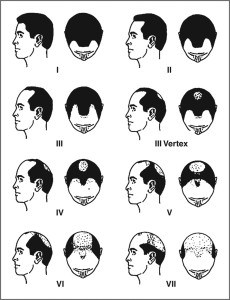What is Male Pattern Baldness?

Male Pattern Baldness, also known as androgenetic alopecia, is the primary cause of hair loss in men. This inherited condition gradually impacts the majority of the male population by the age of fifty. To be more specific, a small percentage of men experience thinning hair as early as 21, and by the age of 35, 75% of all men encounter some degree of hair loss.
This condition is linked to dihydrotestosterone (DHT), a byproduct of testosterone, the male sex hormone. As men age, hair follicles in specific areas of their head, particularly those more susceptible to DHT, start to shrink. The outcome is a reduction in hair thickness or the complete loss of hair in those regions.
While male pattern baldness is a natural occurrence for most men and doesn’t have any other physical impact on their bodies, it can negatively affect their self-esteem, potentially leading to stress and depression.
Treatments Available
Fortunately, over the past decade, science has made significant strides in treating or, at the very least, delaying hair loss. Hair restoration options include the use of medications like Finasteride and Minoxidil, as well as Hair Implants. These treatments address male pattern baldness through distinct approaches. Therefore, if you’re considering treatment, it’s essential to fully understand what each method can offer, along with their respective benefits and drawbacks.
Finasteride, a daily pill, reduces the levels of DHT on the scalp. Its effectiveness varies among individuals, with the majority experiencing a halt in hair loss, and approximately 60% witnessing increased hair growth. However, a notable percentage of men using Finasteride may experience sexual dysfunction, though this often subsides upon discontinuation. It’s crucial to note that stopping the medication may result in a relapse of hair loss, making it a non-permanent solution.
A less aggressive option for treating hair loss in men is Minoxidil, a solution applied directly to the scalp. While it doesn’t impact DHT, the hormone responsible for hair loss, its results are not permanent, and it primarily slows the progression of hair falling out.
However, Minoxidil is not without its side effects, ranging from mild scalp itching, flaking, and irritation to more severe issues such as weight gain, rapid heartbeat, chest pain, and light-headedness.
Hair Transplant Methods
A more drastic approach to achieving hair restoration involves the use of hair implants. Typically, these implants consist of hair plugs sourced from areas where hair continues to grow, commonly referred to as the “donor area” located around the sides of the head. These plugs are then transplanted into areas affected by male pattern baldness. It’s worth noting that this treatment is more expensive compared to the previously mentioned drug options.
The negative side effects associated with this procedure depend on the type of treatment, such as FUT, FUE, or DHI. However, we recommend the FUE procedure due to its higher success rate, with results being both permanent and aesthetically pleasing.
There are also hair implants made of artificial fibers, but doctors tend to discourage their use compared to natural transplants due to a higher risk of infection. Despite this, some men may opt for artificial implants due to their lower cost.
Suturing hairpieces to balding areas is not recommended by doctors, as it provides no real solution to the problem and can irritate the skin, potentially causing scars and infections in severe cases.
For those considering hair loss drugs mentioned earlier, it is generally advisable to consult with a doctor. If you are interested in a free consultation with a specialist in the hair transplant procedure, simply click the button and fill out the provided form.
Patient Testimonials
Aside from achieving fantastic results, we believe that keeping in touch with our patients before, during and after their hair transplantation procedure is paramount – it helps to keep our patients feeling calm and in control. We’re always on hand to provide guidance, support and aftercare advice. Time and again, our patients tell us that this is what sets us apart from other clinics.
You can read our great reviews of FUE hair transplants over on Google and TrustPilot




